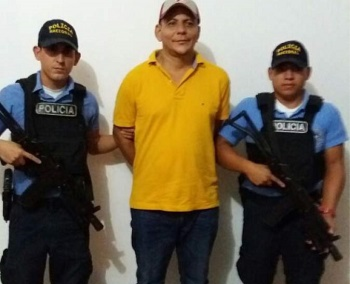The recent arrest in Honduras of a lesser-known suspect in Venezuela’s “narco nephews” case may bring to light additional information about the trafficking network involved, given the defendant’s potentially key role in the international drug scheme.
Honduran police arrested Roberto de Jesús Soto García on the island of Roatán on October 28, reported La Prensa. According to Honduran authorities, the United States is seeking Soto García’s extradition for drug trafficking charges filed against him in June 2016.
The drug charges against Soto García relate to the ongoing prosecution of the nephews of Venezuelan first lady Cilia Flores, Efrain Antonio Campo Flores and Francisco Flores de Freitas. These individuals have been indicted in the United States for their alleged involvement in a conspiracy to ship cocaine from Venezuela to the United States through Honduras. The nephews were arrested in November 2015 in Haiti and were quickly brought to the US. Their trial began on November 7 in a New York courthouse.
According to the US indictment of Soto García, the defendant agreed to facilitate drug shipments arriving at the Roatán airport “by, among other things, providing information regarding the schedule at [the airport], assisting in the arrival of cocaine-laden aircraft, removing cocaine from the plane, and taking steps to evade detection by Honduran customs and law enforcement personnel.”
According to El Heraldo, a source close to the case stated that Soto García “is the person who coordinated the arrival” of the first lady’s nephews in Roatán. This seems to be confirmed by a source who spoke to El Nuevo Herald, alleging that Soto García “is the most important operator on which the nephews relied to move the drugs. He is the logistical man, the one who fixed the arrival of the planes at the airport.”
El Nuevo Herald’s source further added that Soto García “did not only work with the nephews. He has been working with the cartel for many years, and in particular within the operation headed by Tareck El Aissami and his entourage.”
The quote is believed to be a reference to the Cartel of the Suns — covert networks within the Venezuelan military suspected of involvement in drug trafficking — and the current governor of the Venezuelan state of Aragua, Tareck El Aissami, whom the nephews have implicated in drug trafficking.
InSight Crime Analysis
The evidence that has emerged so far indicates Soto García could be the individual referred to by the US Drug Enforcement Administration (DEA) as “El Flaco” or “El Negrito,” a key figure in the trafficking scheme. The arrest could also provide clues as to whether the nephews acted alone or had support from high-ranking Venezuelan officials, including current and former military officers affiliated with the Cartel of the Suns.
SEE ALSO: Cartel of the Suns News and Profile
According to official documents, DEA agent Sandalio Gonzalez declared that the confidential witness known as “El Sentado” — who was killed in Honduras shortly after the nephews’ arrest — informed his liaison officer that “a Honduran national had put [El Sentado] in touch with two Venezuelans who were interested in participating in a cocaine-trafficking venture” in early October 2015.
Following his arrest, Franqi Francisco Flores de Freita told DEA agents that El Flaco put the two nephews in contact with El Sentado, while Efrain Antonio Campo Flores stated that El Flaco had introduced them to “drug traffickers in Honduras.”
These two testimonies clearly indicate that “El Flaco” was a key interlocutor between the Honduran and Venezuelan traffickers, and El Sentado’s testimony suggests El Flaco is a Honduran national.
The indictment brought against Soto García also states that he participated in two meetings in Honduras on November 5 and 6, 2015, including one in which Franqi Francisco Flores de Freita was present.
All this information would be consistent with Soto García being “El Flaco.” A source within the US government acknowledged that Soto García was the person who coordinated the arrival of the nephews in Honduras.
But it’s impossible to be 100 percent certain of El Flaco’s identity until it is publicly confirmed by authorities, especially since there are discrepancies in the US’ official version of events. As previously mentioned, DEA agent Gonzalez declared on July 22, 2016, that a Honduran national had contacted El Sentado to put him in touch with the nephews. Yet at a later hearing on September 8, 2016, agent Gonzalez testified that El Sentado was contacted by the brother of Venezuela’s first lady rather than a Honduran national.
Meanwhile, the possibility that Soto García is a close associate of certain elements of the Cartel of the Suns could have a significant impact on how the “narco nephews” case unfolds. If he was in fact working with elements of the cartel, that would open the door to potential high-level involvement in the case that extends beyond the nephews.
SEE ALSO: Venezuela News and Profiles
This would in turn strengthen suspicions that the nephews were not the mastermind of the operations, but rather a political cover. Recent InSight Crime investigations in Venezuela have found this to be a distinct possibility. And according to court documents, Campo Flores told one of the DEA’s confidential sources that “the plane [containing the drugs] would not be followed by law enforcement upon departure from Venezuela because ‘it departs from here as if … someone from our family were on the plane.’”
The United States is reportedly attempting to speed up Soto García’s extradition process. Should he choose to cooperate with US authorities, he may eventually offer valuable insight on certain aspects of the trafficking dynamics between Venezuela and Honduras, two of the major transshipment points for drugs heading to the United States.

